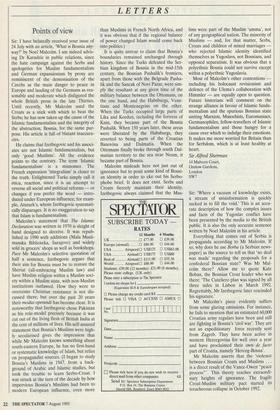LETTERS Points of view
Sir: I have belatedly received your issue of 24 July with an article, 'What is Bosnia any- way?' by Noel Malcolm. I am indeed advis- ing Dr Karadzic in public relations, since the hate campaign against the Serbs and apologetics for Muslim fundamentalism and German expansionism by proxy are reminiscent of the demonisation of the Czechs as the main danger to peace in Europe and lauding of the Germans as rea- sonable and moderate which disfigured the whole British press in the late Thirties. Until recently, Mr Malcolm used the Croats as a stick with which to beat the Serbs; he has now taken up the cause of the Islamic fundamentalists and the integrity of the abstraction, Bosnia, for the same pur- pose. His article is full of blatant inaccura- cies.
He claims that Izetbegovic and his associ- ates are not Islamic fundamentalists, but only 'good Muslims'. All the evidence points to the contrary. The term 'Islamic fundamentalism' is a misnomer. The French expression 'integralism' is closer to the truth. Enlightened Turks simply call it irtica, reaction, since it is an attempt to reverse all social and political reforms — or changes if you prefer the word — intro- duced under European influence; for exam- ple, Ataturk's, whom Izetbegovic systemati- cally 'disparages. It is no exaggeration to say that Islam is fundamentalism.
Malcolm's statement that The Islamic Declaration was written in 1970 is sleight of hand designed to deceive. It was repub- lished in 1990 with additions (Mala Musli- manska Biblioteka, Sarajevo) and widely sold in grocers' shops as well as bookshops. Pace Mr Malcolm's selective quotation of half a sentence, Izetbegovic argues that their aim for Bosnia must be to restore the Sheriat (all-embracing Muslim law) and have Muslim religion within a Muslim soci- ety within a Muslim state, with non-Muslim institutions outlawed. How they were to overcome Christian resistance is not dis- cussed there; but over the past 20 years their modus operandi has become clear. It is noteworthy that Izetbegovic chose Pakistan as his role-model precisely because it was cut out of the living flesh of British India at the cost of millions of lives. His self-assured statement that Bosnia's Muslims were high- ly secularised gives the impression that while Mr Malcolm knows something about south-eastern Europe, he has no first-hand or systematic knowledge of Islam, but relies on propagandist sources. (I began to study Bosnia's Muslims in 1947, from a back- ground of Arabic and Islamic studies, but took the trouble to learn Serbo-Croat. I was struck at the turn of the decade by how impervious Bosnia's Muslims had been to modern European influence, even more than Muslims in French North Africa, and it was obvious that if the regional balance of power changed Islam would come back into politics.) It is quite untrue to claim that Bosnia's boundaries remained unchanged through history. Since the Turks defeated the Ser- bian kingdom of Bosnia in the mid-15th century, the Bosnian Pashalik's frontiers, apart from those with the Belgrade Pasha- lik and the Sancak of Novi Pazar, were sim- ply the resultant at any given time of the military balance between the Ottomans, on the one hand, and the Habsburgs, Vene- tians and Montenegrins on the other. When the Turks occupied large parts of Lika and Kordun, including the fortress of Knin, they became part of the Bosnia Pashalik. When 150 years later, these areas were liberated by the Habsburgs, they reverted to being parts of the Croatian Banovina and Dalmatia. When the Ottomans finally broke through south Dal- matian territory to the sea near Neum, it became part of Bosnia.
Malcolm misleads here not just out of ignorance but to posit some kind of Bosni- an identity in order to eke out his Serbo- phobe brief. It does not exist. Serbs and Croats fiercely maintain their identity. Izetbegovic always claimed that the Mus- lims were part of the Muslim `umma', not of any geographical nation. The minority of Muslims — and, for that matter, Serbs, Croats and children of mixed marriages who rejected Islamic identity identified themselves as Yugoslays, not Bosnians, and opposed separatism. It was obvious that a polyethnic Bosnia could not survive except within a polyethnic Yugoslavia.
Most of Malcolm's other contentions including his holocaust revisionism and defence of the Ulema's collaboration with Himmler — are equally open to question. Future historians will comment on the strange alliance in favour of Islamic funda- mentalism and the spurious Bosnian state uniting Marxists, Masochists, Euromaniacs, Germanophiles, fellow-travellers of Islamic fundamentalism and those hungry for a cause over which to indulge their emotions. It makes me more worried for Britain than for Serbdom, which is at least healthy at heart.
Sir Alfred Sherman
14 Malvern Court, Onslow Gardens, London SW7


















































 Previous page
Previous page